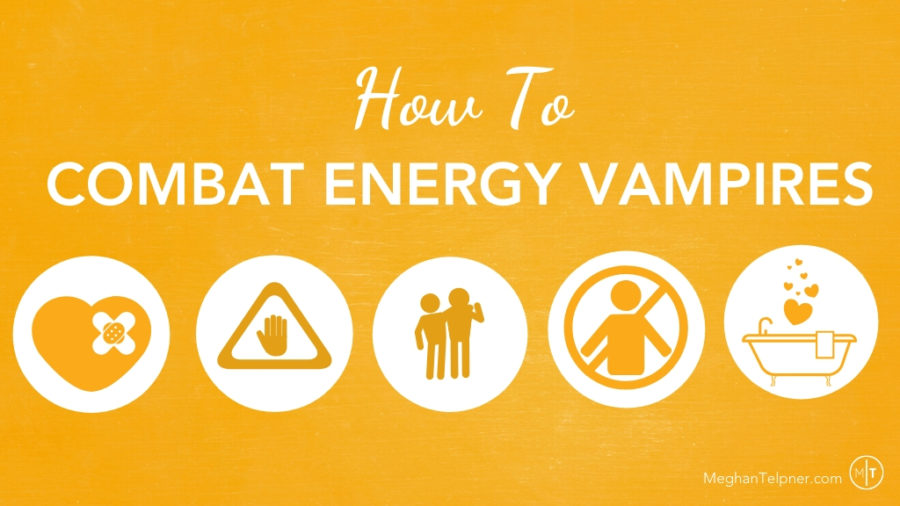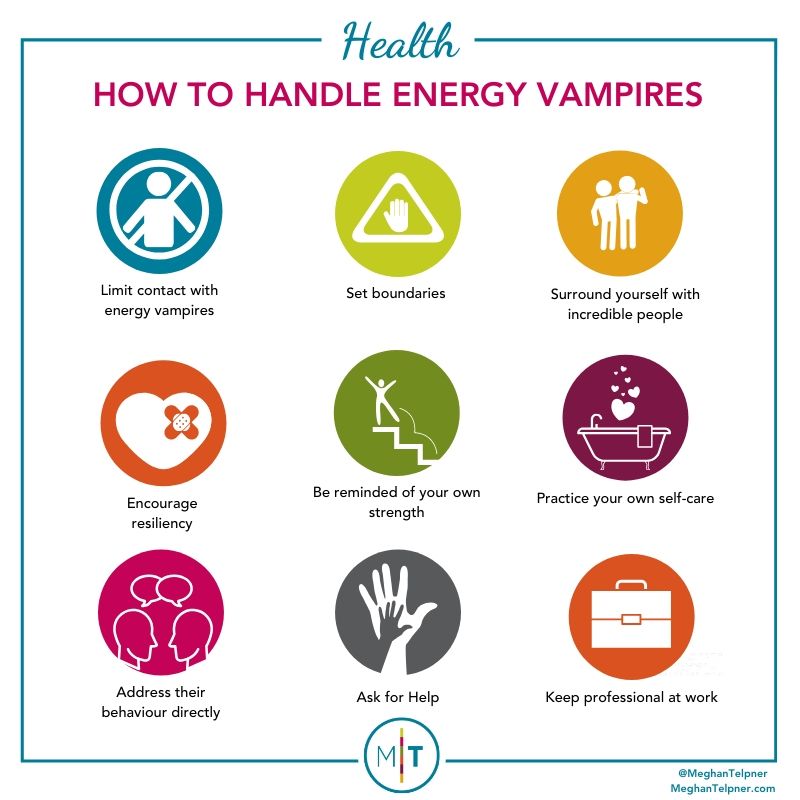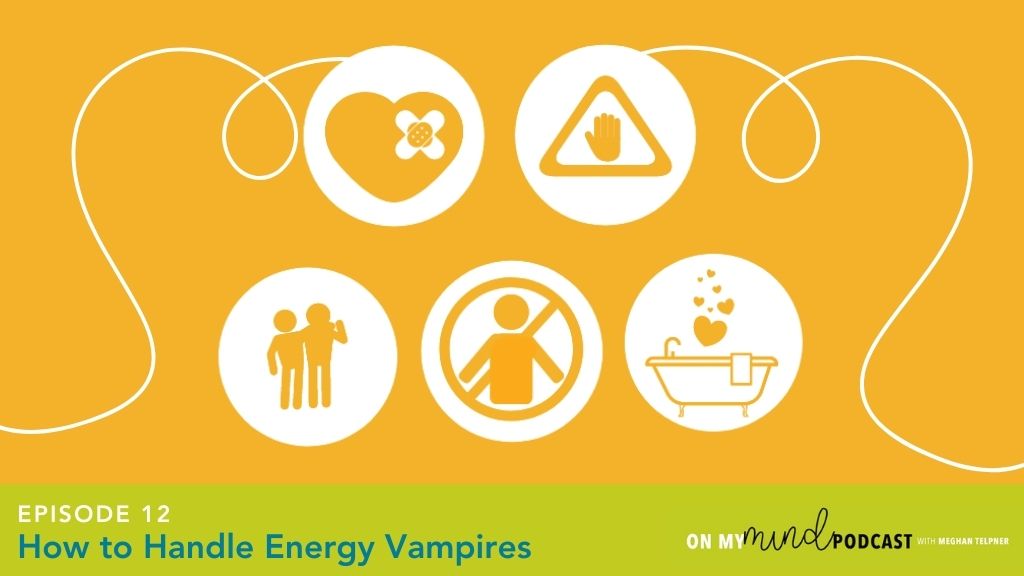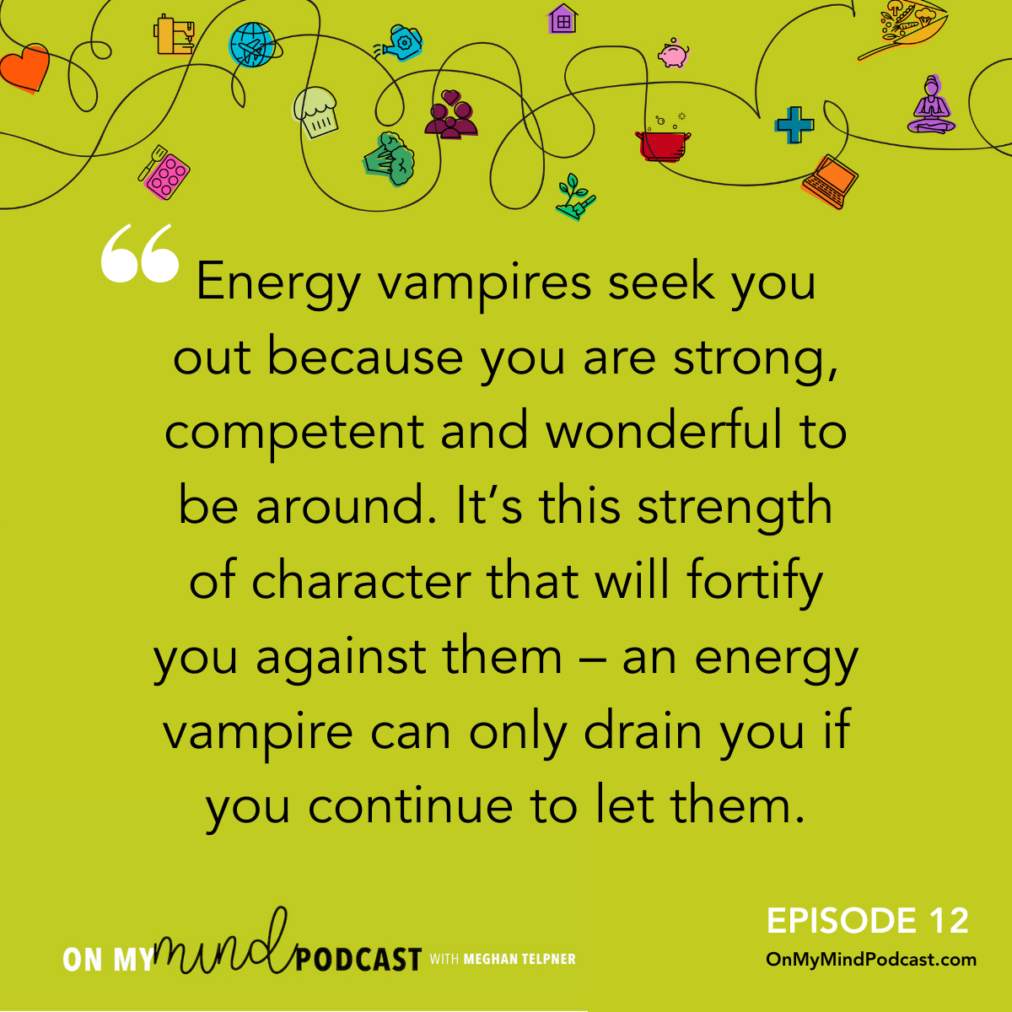How to Handle Energy Vampires

We all have a finite number of hours in the day to work, cook and eat, sleep, socialize, exercise, pursue hobbies, do nothing and all of the other things that make life awesome. Nature abhors a vacuum and so we fill what time we have. As life remains full to the brim, I do everything I can to protect myself from the drains. These are the people, thoughts, activities, and tasks that make our days more exhausting than they need to be. I am talking about energy vampires and they can leave us feeling absolutely depleted at the end of the day. Imagine what they do over a week, a month and a lifetime?
The consequences of persistent exposure to energy vampires can be as damaging to our health as poor eating habits or lack of sleep and exercise. Managing the impact of energy vampires is challenging. We have to be smart and committed! This requires our own discipline, delicacy and diplomacy. I have definitely not mastered the subtle art of dodging the human energy vampires, but as an art, it’s always a work in progress. Here’s what I have for you that has helped me better handle them.
What Are Energy Vampires?
The Human Form of Energy Vampires
The most common type of energy vampires are the human form. These are people who tend toward the “me, me, me” train of thought, and find it difficult to see beyond their own point of view. The biggest challenge with the human energy vampire is that because they are so focussed on their needs and wants, they usually have absolutely no awareness as to the impact they are having. They don’t see the pile of exhausted humans that trail behind their interactions. With a simple conversation, a passive aggressive criticism, where before you had a skip in your step, you’re now feeling zapped of your physical, mental, emotional or spiritual energy (or a combination of these).
The human energy vampires could be friends, family members, co-workers or romantic partners.
Human energy vampires can suck the wind from your sails in many ways:
- Overly dramatic: creating large problems or drama when there is in fact very little offence
- Whiny: constantly complaining about everything that happens to them, or having a ‘why me?’ attitude
- Negative: always seeing the bad things and never focusing on the good or practicing gratitude
- Blaming: nothing is ever their fault and they are reluctant to take personal responsibility; they can often play the victim
- Insecure: they feel sad, low or insecure about their lives and abilities, so they are constantly seeking affirmation from others
- Jealous: feeling jealous or resentful of what you or other people have going on, so they may behave with spite or try to downplay your accomplishments
- Dominant: always the centre of attention and very outgoing, but never stops to listen, pay attention or ask how anyone else is doing
- Gossipy: focusing on other people’s behaviour and constantly talking about (or judging) others
- Needy: relying on others too much, not developing resourcefulness or self-sufficiency
- Prone to giving guilt trips: using emotional manipulation to make you feel guilty so they can get what they want
In general, energy vampires have trouble coping with their own lives so they feed off others to sustain themselves. Unfortunately, that is very draining and downright unpleasant for those around them.
Thought-Induced Energy Vampires
Thoughts in and of themselves can be our own worst energy vampire. We can manufacture our own stress around the future, around an activity, a work assignment, a relationship and let those thoughts spin beyond our grasp. I often refer to this form of vampirism as The Iron Filings. Think of being a kid in the 80s when you were allowed to play with magnets and loose iron filings in school. You’d drag the magnet along the floor and the iron filings would magnetize and stick to others. This is similar to what happens with our thoughts – one challenging thought begins to pick up speed and as it does, starts collecting a whole bunch of other stressful and draining thoughts along with it.
Our own stressful thoughts are one of the greatest drains on our energy, and producer of stress in our lives. Most often these thoughts pertain to things that happened in the past, or that might happen in the future, yet both are out of our control, are unchangeable (especially if they happened in the past), and have no bearing on reality and most likely not going to happen in the future. It’s basically a stress we create in our own mind that we allow to dominate our emotions and drain us of energy.
Our thoughts can turn any communication, task or activity into an energy drain simply by choosing to worry, dread, fret or delay (yes, procrastination is another very common thought-triggered energy vampire).
And some of us (I count myself here) are simply more sensitive to our surroundings and internal processes than others. This is where empathy comes in.
empaths and empathy
Energy vampires cannot feed off one another – they need someone who will bear the load of their problems and emotions. This could feasibly be anyone who is kind and compassionate, but often it is empaths that are especially susceptible to energy vampires. Have you ever heard of an intuitive empath. You know at least one. Me.
Empaths are highly sensitive and highly intuitive people who easily absorb other people’s emotions. Dr. Judith Orloff, a psychotherapist, has written extensively about empaths and how they can best survive in the world when it so easy for them to become overwhelmed with the problems of others. You can read more about the common traits of empaths here, which include being introverted and feeling replenished by nature, among many other qualities.
Empathy is an incredibly important quality to develop and practice. It allows us to understand how other people are feeling from their point of view, which in turn allows us to be warmhearted and understanding. Empathy has evolutionary roots and we are biologically designed this way (though some of us have a more innate ability than others, it can definitely be taught).
While we tend to think of human survival in terms of ‘survival of the fittest’, the truth is we can’t survive alone. Empathy allows us to create communities, feel connected to one another, find our community, have satisfying social lives and help each other survive and thrive. In a medical context, empathy from doctors, nurses and other medical professionals leads to greater patient satisfaction and better health outcomes. Studies of healthcare professionals show that staff who are burned out tend to have lower empathy. This makes sense – when you are depleted, you have less capacity to take on anything else.
Not all people who are empathetic are empaths, and this may allow them to set more distinct boundaries with energy vampires.
Intuitive empaths become prime targets and prime reactionaries to the internal vampires that are their own thoughts and external vampires that are energy-zapping humans. We are simply more sensitive and responsive to both our inner and outer environments.
Health Risks of Energy Vampires
Our brains and bodies are intricately connected, and we are designed to bond and socialize with other people. Social interaction can produce oxytocin, a hormone that can facilitate love, security and calm the nervous system. When we interact with energy vampires, the whole ordeal can cause us to release the stress hormone cortisol. This induces a stress cascade that may lead to:
- Burnout
- Digestive issues
- Hormone imbalances
- Fatigue
- Lowered immunity, which may leave us susceptible to minor colds and flu or serious autoimmune diseases
- Inflammation (this is basically the root cause of many diseases)
- Poor eating habits or stress eating
First Work On Yourself
Sometimes what we experience in the world is actually a mirror of how we are. If you notice that everyone in your life is sucking the life out of you, take some time to take an honest look at yourself. Are you in any way an active participant in the patterns that are unfolding? This doesn’t excuse anyone else’s actions, but it may help you change or reduce how often this is happening.
The other thing to remember is the role our own thoughts play in how we experience the world around us. We have the power to turn an innocent comment into a major drama, simply by thinking of it that way. To combat these tendencies, it’s important to find ways to make our minds work in favour of a positive and stabilized mood, such as Cognitive Behaviour Therapy (CBT), and allowing time to rest so we can be less reactive and have better responsiveness.
Yes, working on ourselves is key, but we also need to know how to arm against the energy vampires, too. I offer some guidance on how to work with them and, if needed, get away from them – because ultimately, we have the choice to decide how we respond to the world around us.
How to Deal with Energy Vampires in Life and At Work
In an ideal world, we’d “Marie Kondo” the heck out of those energy vampires and never have to deal with them (they certainly don’t spark joy!). Unfortunately, we can’t always avoid being in the presence of an energy vampire at work, at family gatherings or in social situations. And for those of us with active minds, even a passing, innocent comment can spark the internal thought-induced energy vampire. The magnet hits the iron filings and the cascade of spinning and draining begins. Thankfully, being around an energy vampire doesn’t have to suck the energy out of you.
A first step is realizing that we can’t change energy vampires (or anyone else, for that matter). We can only alter our own behaviours and attitudes. These tips can help you handle energy vampires and your own wellbeing at the same time.
The only thing we can ever control is how we respond to what’s happening in our minds and in our lives.
Reduce or Limit Contact with Energy Vampires
Set Boundaries and Say No
If you are in a situation where you can’t avoid an energy vampire, set boundaries for both yourself and the vampire. For example, you may resolve to only stay for an hour and then make a polite exit, without being deterred by the energy vampire’s pleading. You can also set boundaries within the conversation you’re having with the other person by not encouraging their behaviour – that may mean shutting down the conversation or changing the topic. Dr. Orloff has some strategies that will help based on the type of energy vampire you are dealing with.
Call the Energy Vampires on Their Behaviour
Encourage Resiliency
Remind Yourself of Your Own Strength
Practice Physical and Emotional Self-Care
Prioritize whatever you need to do to maintain your physical, emotional and spiritual health. That might be hobbies, baths, meditation, exercise, napping, or whatever you need to feel nourished and replenished, especially if an interaction with an energy vampire is depleting. I have a few detailed guides to self-care you can peruse for ideas:
Seek Out the Energy Boosters
Ask for Help
Call on partners, colleagues or friends to help you handle energy vampires: you don’t have to deal with them on your own. Some people are discerning and will naturally learn your cues quickly when you need them to step in and help, but in many cases it’s best to be upfront with what you need. Tell them to never leave you alone with Uncle So and So or devise other strategies to help you diffuse or handle energy vampire situations.
Keep It Professional at Work
Energy Vampires Further Reading and Resources
- Dr. Judith Orloff (her books are great!)
- Dodging Energy Vampires by Dr. Christiane Northrup
- Mind Over Mood by Dennis Greenberger
- Cognitive Behavioural Therapy Made Simple by Seth Gillihan
One more thing before I leave you on your way to ponder the vampires in your life. You could be one, too. Just something to consider. What is the energy you are putting out, and what is the energy you are taking? This is something to consider in your own interactions. We want to aim for the balance. With friends and family, optimally the balance is over a lifetime. Sometimes we give and sometimes we take. Giving, however, doesn’t need to be a drain. It’s ultimately up to each of us to determine the boundaries, and set our own limits.

On My Mind Episode 12: How to Handle Energy Vampires

Subscribe today on your favourite podcast app and never miss an episode.

Free Resource Library
Enjoy more than 40 downloadable guides, recipes, and resources.


























I love this post, it contains so many key techniques and promotes a level of awareness of yourself and others to allow for healthy boundaries and moving forward in the best possible way. And it is so nice to know I am not alone in being challenged by this. I too identify as an intuitive empath and spent a lot of years feeling completely drained by some key people in my life. Thanks in part to Dr Judith Orloff’s fabulous work I learned to set healthy boundaries for myself and set up some essential self care practices. As a result some of these relationships are no longer in my life, which has been challenging, but ultimately the best for my health and sanity.
Thank you so much for this timely, helpful and empowering post.
Such a great article with so many constructive points. I wondered about whether an energy vampire would try to “peg” a person who wasn’t receptive to their tactics as an energy vampire, since it seems they are completely unaware of their own emotional immaturity. Seems to be the case, regardless, and compassion is the answer. Thank you so much for sharing this with the world!